

Are PhD graduates expecting too much? When it comes to PhD graduates, it’s clear that supply now far outstrips demand.
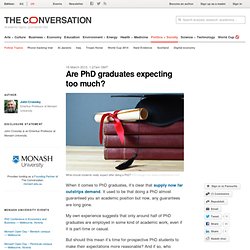
Transitioning out from a PhD to “industry” – It’s all about YOU! A little while ago I wrote some articles on risk management in PhD’s, and on the importance of broad mentorship of early-career health and medical research scientists.
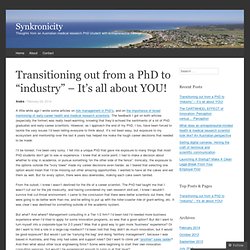
The feedback I got on both articles (especially the former) was really heart-warming, knowing that they’d echoed the sentiments of a lot of PhD graduates and early-career scientists. However, as I approach the end of my PhD, I too, have been forced to tackle the very issues I’d been telling everyone to think about. It’s not been easy, but exposure to my ecosystem and mentorship over the last 4 years has helped me make the tough career decisions that needed to be made. Q&A: Life After a Ph.D. COPENHAGEN—Two of the first career sessions held at Euroscience Open Forum (ESOF) 2014 last week explored the employment situations of Ph.D.
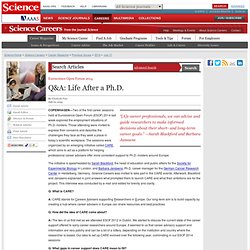
-holders. Those attending were invited to express their concerns and describe the challenges they face as they seek a place in today’s scientific workplace. The sessions were organized by an emerging initiative called CARE, which aims to act as a platform for helping professional career advisers offer more consistent support to Ph.D. -holders around Europe. The initiative is spearheaded by Sarah Blackford, the head of education and public affairs for the Society for Experimental Biology in London, and Barbara Janssens, Ph.D. career manager for the German Cancer Research Center in Heidelberg, Germany.
To be a Leader, First Know Your Numbers. Building a Better Internship. Career Visioning for Ph.D.s. If You Want Career Advancement, Upskill. How to find a career away from the bench : Nature Jobs Blog. Pwc (2012): From vision to decision Pharma 2020. Nature Biotechnology (2008): Technology transfer and idea commercialization. Naturejobs (2004): Dual competencies. As biotechnology companies grow, they tend to develop their operational and management team by bringing in people who have dual competencies — formal qualifications in both science and business.
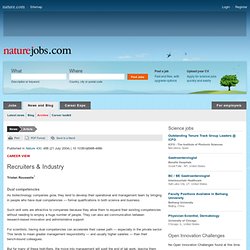
Such skill sets are attractive to companies because they allow them to expand their existing competencies without needing to employ a huge number of people. They can also aid communication between research-based innovation and administrative support. For scientists, having dual competencies can accelerate their career path — especially in the private sector. This tends to mean greater management responsibility — and usually higher salaries — than their bench-bound colleagues. But for many of these high-fliers, the move into management will spell the end of lab work, leaving them facing an office-based future. For example, a knowledge of accounting and finance is essential in product development for understanding investment, value and the return on investment.
Science Careers (Tooling Up): Questions to Set Your Sails By (Part 1) I wrote in a recent column that it isn’t always your answers that earn you a job offer—it has just as much to do with your questions.
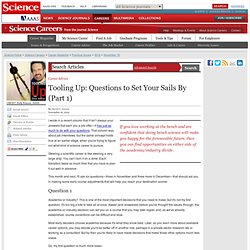
That column was about job interviews, but the same concept holds true at an earlier stage, when you're trying to figure out what kind of science career to pursue. Steering a scientific career is like steering a very large ship: You can’t turn it on a dime. Each transition takes so much time that you have to plan it out well in advance.
This month and next, I'll ask six questions—three in November and three more in December—that should aid you in making some early course adjustments that will help you reach your destination sooner. Question 1. Opportunity Knocks: But Which Door Should You Open? Game-changing career opportunities for postdocs are everywhere.
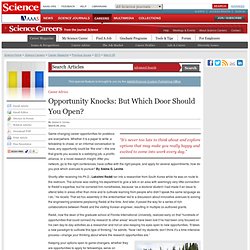
Whether it is a paper to write, a fellowship to chase, or an informal conversation to have, any opportunity could be “the one”—the one that grants you access to a satisfying job, a prolific alliance, or a novel research insight. After you network, go to the right conferences, have coffee with the right people, and apply for several appointments, how do you pick which avenues to pursue? Science Careers (1997): Biotech sales and marketing. With Dick Woodward, Ph.D.
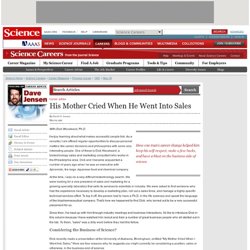
I enjoy learning about what makes successful people tick. As a recruiter, I am offered regular opportunities to discuss personal matters like career decisions and philosophies with some very interesting people. One of these is Dick Woodward, a biotechnology sales and marketing consultant who works in the Philadelphia area. Science (2002): Business of science *Feature Index* Internships Boost Postdocs' Skills, Worldliness, and Marketability. Science Careers Forum - Biotech, Pharmaceutical, Faculty, Postdoc jobs on Science Careers. This list of commonly asked career questions was compiled by the advisor and moderators from previous threads on this forum.
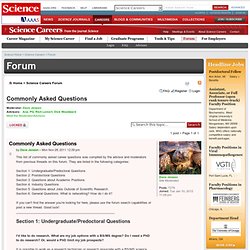
They are listed in the following categories: Section 1: Undergraduate/Predoctoral QuestionsSection 2: Postdoctoral QuestionsSection 3: Questions about Academic PositionsSection 4: Industry QuestionsSection 5: Questions about Jobs Outside of Scientific ResearchSection 6: General Questions. NIH Program Trains Scientists for Nontraditional Careers. A love of science can inspire a career in research, but it is not enough to deliver the goods: Only about 15% of biomedical Ph.D. researchers ever secure a tenure-track position.
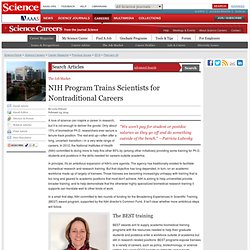
The rest end up—often after a long, uncertain transition—in a very wide range of careers. In 2012, the National Institutes of Health (NIH) committed to doing more to help this other 85% by (among other initiatives) providing some training for Ph.D. students and postdocs in the skills needed for careers outside academia. Planning a Career in Today's Landscape. When, after completing my Ph.D. in immunology, I told colleagues and mentors that I had accepted a position as a Science & Technology (S&T) Policy Fellow at the American Association for the Advancement of Science (AAAS)—publisher of Science Careers—the most common response was, "So, you're leaving science?
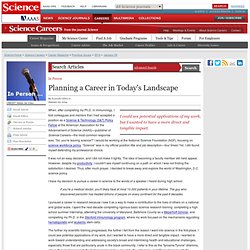
" I would be working at the National Science Foundation (NSF), focusing on science workforce policy. "Science" was in my official position title and job description—four times! Nontraditional Career Options for Life Scientists. There is a growing realization among many American life sciences graduate students and postdoctoral fellows that a job as a tenure track assistant professor or research scientist at a pharmaceutical or biotechnology company may no longer be a viable option.
This trend largely has been driven by cuts in research funding, fewer tenure track positions and the outsourcing of research and development jobs to Asia, Eastern Europe and South America by a growing number of pharmaceutical and biotechnology companies. Because most graduate programs continue to emphasize, and almost exclusively focus on, training for traditional academic and industrial research careers, newly minted doctorates and postdocs are finding it nearly impossible to find jobs.
Research options for PhDs in life sciences. Jesse Richardson-Jones, PhD, works with graduate students at a career symposium called "What Can You Be With a PhD? " at the NYU Langone Medical Center last November. Dr. Richardson-Jones, a medical writer for BGB New York who was associate scientific director for Medicus International at the time, has a PhD in pharmacology and neuroscience from Columbia University. More than 1,300 people attended the two-day event. (Photos by Jeff Weiner for NYU Langone Medicinal Center) The Author Susan Elan Susan Elan received a Master of Public Health degree this spring from the New York Medical College School of Health Sciences and Practice.
From Academe to Market Research - Manage Your Career. By Donny Wong So much has happened in the decade since I last wrote for The Chronicle about my nonacademic job search. Then I was finishing up my Ph.D. in the life sciences and considering a career in consulting. Ten years later, I am living overseas in London, I'm married to a Brit, and, most relevant here, I have a career in the pharmaceutical industry. My years as a bench scientist feel like they occurred several lifetimes ago. Toward the end of graduate school, I began looking for a job in management consulting, since that industry was actively recruiting Ph.D.'
The Geography of Hiring in Alternate STEM Careers - On Hiring. Do you know where you’d like to live? To borrow from Aesop, are you a city mouse or a country mouse or perhaps, like me, a suburban mouse? What kind of weather do you enjoy, or wish to avoid, whether that’s blistering heat or months of dark, snowy days? Do you prefer the indoors, or do you crave fresh air? I am truly surprised by how few students receive career counseling that urges them to consider not only their aptitudes and skills, but also what kind of whole life they want to live. Because let’s face it: Some higher-education and career decisions come saddled with strict geographic restrictions. A Reality Check on the Biomedical Job Market. Big Wide World: Careers advisor: Is it OK not to do a PhD? Stephanie MacLean, careers advisor at the University of Dundee.
Improve Your Productivity in Graduate School. Hidden Talents, Hungry Markets: Ph.D.s Have Many Skills to Offer Industry. The Top Five Career Regrets - Daniel Gulati. By Daniel Gulati | 8:00 AM December 14, 2012. There’s No Such Thing As Career Planning. Class of 2013: Your Careers Will Be Volatile and Risky. Learn to Love It.